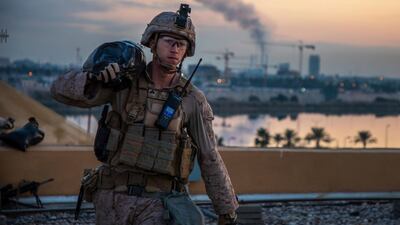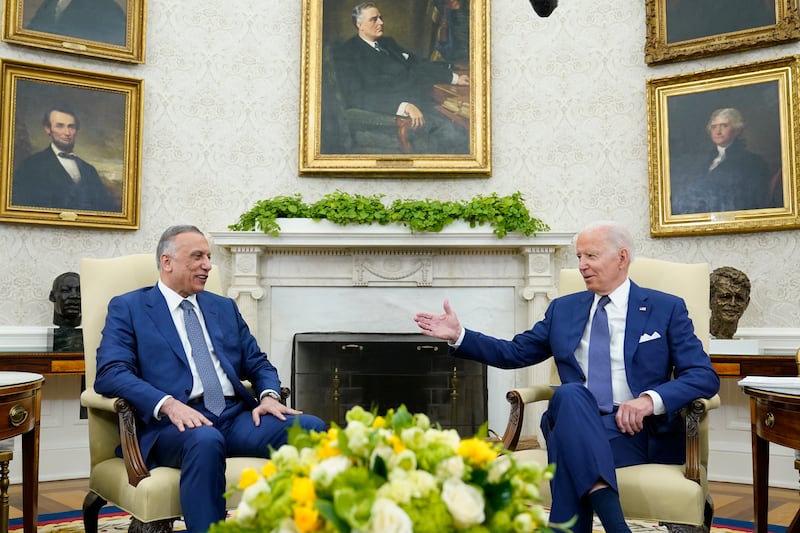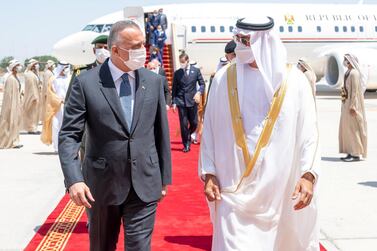The US has announced its intention to withdraw combat troops from Iraq – again. In 2011, under the command of then President Barack Obama, the US declared a full withdrawal of US troops from Iraq, except for an undisclosed number for “train and assist missions”.
Three years later, combat troops were back to fight ISIS.
Then, in September 2020, the US made a similar announcement. This time, former President Donald Trump said he would reduce the number of troops in Iraq to 3,000 soldiers to “train and assist” Iraqi forces.
And now, on Monday, US President Joe Biden and Iraqi Prime Minister Mustafa Al Kadhimi issued a joint statement after their meeting in the White House, saying: “the security relationship will fully transition to a training, advising, assisting and intelligence-sharing role, and that there will be no US forces with a combat role in Iraq by December 31, 2021”.
Iraqi and American officials have been briefing journalists and analysts about the significance of the withdrawal of combat troops for days, as both Mr Al Kadhimi and Mr Biden want to appear to be delivering on domestic promises. Yet, the key point is that US troops will continue to maintain a presence in Iraq. For those who want to see a continued American engagement in the country, this is good news. For militias who want to attack Mr Al Kadhimi and the US, this is also good news as they can continue to claim “resistance to the US”, while they attack Iraqi bases and personnel.

Monday’s meeting between Mr Al Kadhimi and Mr Biden was significant as it sent a renewed signal of US interest in Iraq. The US announced that it will donate 500,000 Pfizer-BioNTech vaccine doses to Iraq via Covax. And the US State Department announced it will “continue to support efforts to prevent Covid-19 through community awareness, the promotion of vaccine acceptance, the sustainment of primary health care services and the provision of mental health and psychosocial support”. But how all of this will be delivered is unknown.
A number of other announcements were made of US support to Iraq and some of them – similar to the troop announcement – were recycled.
The White House meeting was also, as expected, a boost for Mr Al Kadhimi. Soon after the meeting, Iraq's parliamentary bloc, Sairoon, affiliated with cleric Moqtada Al Sadr, issued a statement stating: “we appreciate the great efforts made by the Iraqi government to formulate a national vision that contributes to achieving the full sovereignty of Iraq”. It then added, “we renew our position rejecting the presence of any foreign forces on Iraqi soil”. The two sentences have become staples for Sairoon and other political parties who seek to maintain a populist line rejecting “foreign forces”, while also realising that the presence of US troops can help limit the control of extremists militias and expansionism of Iran. Similarly, Iraqi President Barham Salih and former Prime Minister Haider Al Abadi, who leads Al Nasr coalition, announced their support for the US-Iraq strategic dialogue.
By the time Mr Al Kadhimi gets back to Baghdad, he will have two months to prepare for parliamentary elections in October. While he is not standing in the elections, Mr Al Kadhimi has ambitions to be prime minister once again. He will need the support of blocs like Sairoon, even though Al Sadr has declared it will not support the formation of the next government.
In one year, Mr Al Kadhimi has visited all the capitals that can influence the fate of Iraq. More importantly, he has visited many Iraqi cities and entities that rarely get official attention. He is hoping to garner enough support to be renamed prime minister.
The big challenge that faces the entire political class, and particularly Mr Al Kadhimi, is whether Iraqis will turn out to cast their votes in October. There is a general sense of malaise among Iraqis and a disbelief that change can be brought about by the ballot box. The proliferation of militias, organised crime and corruption has undercut the Iraqi state, particularly in providing security for its people.
While both US and Iraqi officials stressed the importance of ensuring the integrity of the Iraqi state during this week’s meetings in Washington, the reality is that its sovereignty is violated by domestic armed groups backed by Iran, rather than by the presence of foreign troops.
A case in point is the airing of confessions of the killer of analyst and activist Hisham Al Hashimi earlier this month. One year after his murder, the ultimate culprit who ordered the assassination is still unknown. The Iraqi government broadcast the confessions of Ahmed Kinani, an officer in the Ministry of Interior, saying that he killed Al Hashimi, without articulating who gave Kinani the order.
By all indications, one of the militias in the country was behind the assassination. The Iraqi government, however, does not want to escalate tensions with the armed groups and thus withheld that information.
Ironically, the Iraqi government was willing to say one of its own ministries is penetrated by murderers, but is not willing to name any armed group. That paradox – the willingness to sacrifice public faith in the Ministry of Interior, rather than uncover the name of the militia responsible for the killing of Al Hashimi – explains the lack of sovereignty in the country. And that paradox will continue to dictate the realities of Iraq.
However, with continued American military presence and political engagement, those who want to push back against the militias have a better chance of success than without it.
The joint statement of the US-Iraq Strategic Dialogue states: “the United States intends to continue its support for the Iraqi Security Forces, including the Peshmerga, to build their capacity to deal with future threats”.
Whether this support includes militias and Iranian-backed groups remains to be seen.






